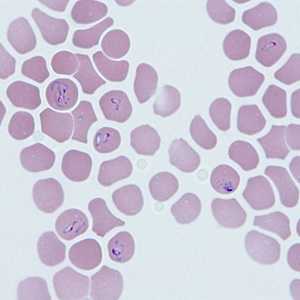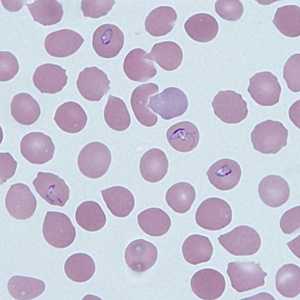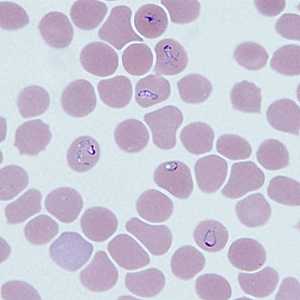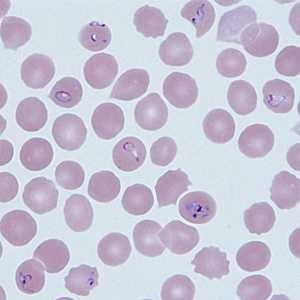
Case #290 - December, 2010
A 31-year-old man was admitted to a local hospital with fever, chills, myalgia, and fatigue. His travel history included a two week work-related trip to Cambodia and a one week vacation in Connecticut immediately after that trip. His symptoms began about 3 days after returning from Connecticut. He indicated that he did take anti-malarial prophylaxis while in Cambodia but failed to take the remainder of his medication before going to Connecticut. Blood smears were ordered, stained with Giemsa, and examined. Figures A-D show what was observed at 1000x oil magnification. What is your diagnosis? Based on what criteria?

Figure A

Figure B

Figure C

Figure D
Case Answer
This was a case of babesiosis caused by Babesia sp. Morphologic features included:
- pleomorphic and vacuolated intraerythrocytic ring-like parasites in normal-sized red blood cells.
- an absence of malarial pigment found in Plasmodium species.
In general, identification of Babesia to the species or strain level is not possible by morphology, and requires molecular analysis of a blood specimen. Regrettably, no pretreatment blood was available in this case for subsequent testing so the final diagnosis remains Babesia sp.
More on: Babesiosis
Images presented in the monthly case studies are from specimens submitted for diagnosis or archiving. On rare occasions, clinical histories given may be partly fictitious.
DPDx is an education resource designed for health professionals and laboratory scientists. For an overview including prevention and control visit www.cdc.gov/parasites/.
- Page last reviewed: August 24, 2016
- Page last updated: August 24, 2016
- Content source:
- Global Health – Division of Parasitic Diseases and Malaria
- Notice: Linking to a non-federal site does not constitute an endorsement by HHS, CDC or any of its employees of the sponsors or the information and products presented on the site.
- Maintained By:


 ShareCompartir
ShareCompartir